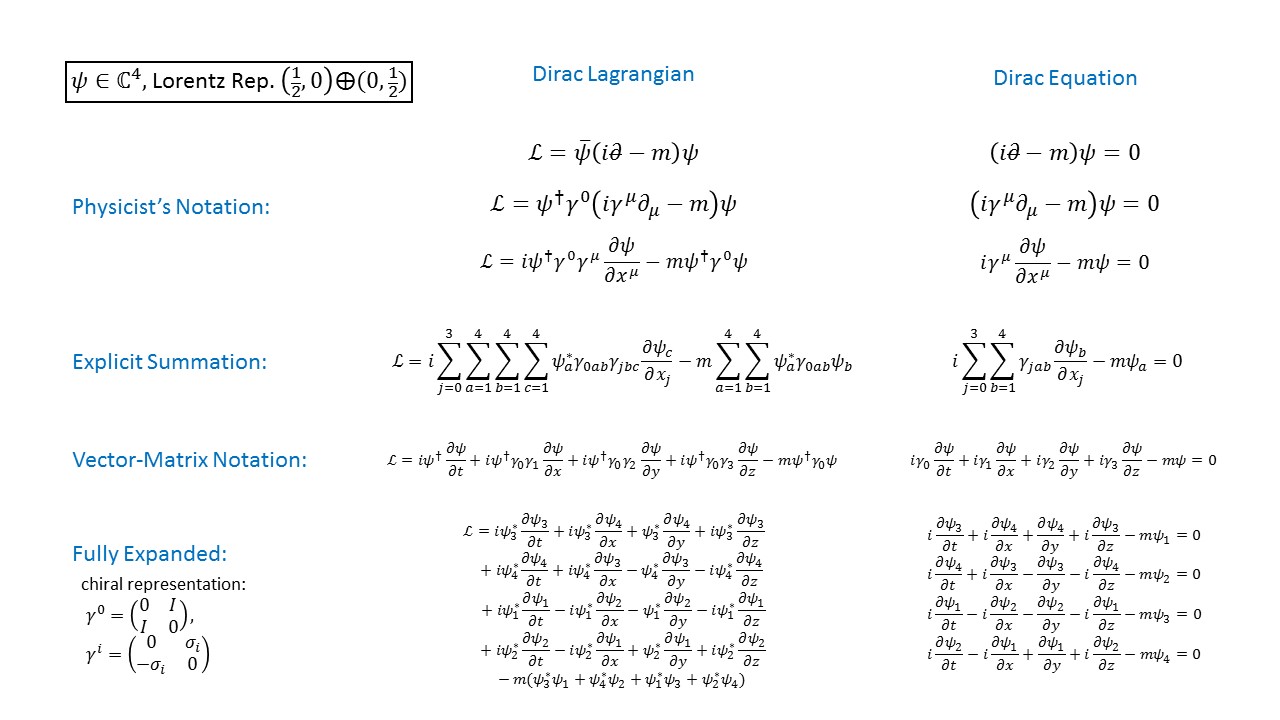$ (i\gamma_\mu \partial^\mu - m ) \Psi =0 $
Dirac Equation
Intuitive
The Dirac equation describes how the state of a relativistic (= fast moving) quantum system with half-integer spin changes in time.
The analogous equation for systems without spin is the Klein-Gordon equation.
If the system only moves slowly, the Dirac equation becomes the Pauli equation.
Concrete
- A nice discussion can be found in chapter 4 of Klauber's Student Friendly QFT book
- For an elementary derivation and a discussion of what the solution of the Dirac equation mean, see Physics from Symmetry by Schwichtenberg
- Alternative, two possible derivations can be found at page 100ff in Relativistic Quantum Mechanics by Paul Strange
- A great discussion can be found in chapter 10 of the quantum field theory book by Matthew Schwartz.
- Another great discussion, especially of question how many degrees of freedom a Dirac spinor has can be found in http://www.damtp.cam.ac.uk/user/tong/qft/four.pdf
Gamma Gymnastics:
There are many important rules for the $\gamma$ matrices that appear in the Dirac equation. These rules are important for many practical calculations.
- For a nice description, see section 7.4.3 "Diracology" in the book The Conceptual Framework of Quantum Field Theory by Duncan
Graphical Summary
The diagram below shows the Dirac equation and its Lagrangian in various forms. For a more detailed explanation see Fun with Symmetry.

Abstract
Why is it interesting?
The Dirac equation is the correct equation of motion that describes free spin $1/2$ particles.
In fact, Dirac's equation for the electron must be rated, alongside the Maxwell and Einstein equations, as one of the Great Field Equations of physics.page 289 in "The Emperors new Mind" by Penrose
Definitions
- $\partial _{\mu} $ denotes the partial derivative and $ \gamma_{\mu} \partial^{\mu}$ stands for a sum using the Einstein sum convention, i.e. $\gamma_{\mu} \partial ^{\mu} = \gamma_0 \partial^0 - \gamma_1 \partial^1 -\gamma_2 \partial^2 -\gamma_3 \partial^3$,
- $m$ denotes the mass of the particle,
- $\Psi$ is either the wave function of the spin $1/2$ particle if we use the Dirac equation in a particle theory, or describes the spin $1/2$ field if we work in a field theory. In any case, $\Psi$ is not a vector but a spinor.
- $\gamma_\mu$ are the Dirac gamma matrices.
History
“A great deal more was hidden in the Dirac equation than the author had expected when he wrote it down in 1928. Dirac himself remarked in one of his talks that his equation was more intelligent than its author. It should be added, however, that it was Dirac who found most of the additional insights.” Weisskopf on Dirac
Niels Bohr: “What are you working on Mr. Dirac?” Paul Dirac: “I’m trying to take the square root of something”